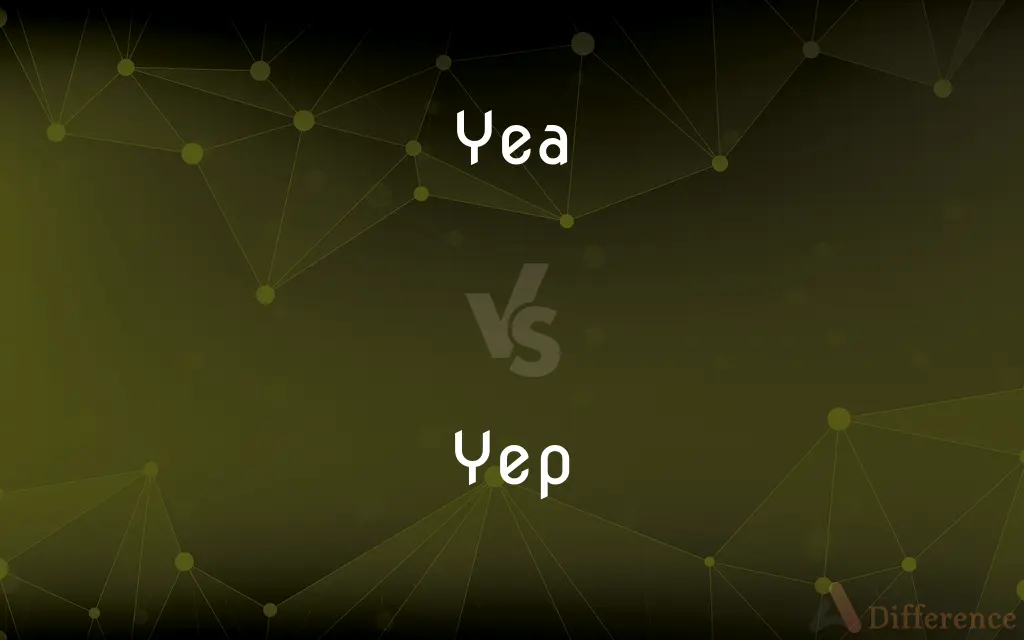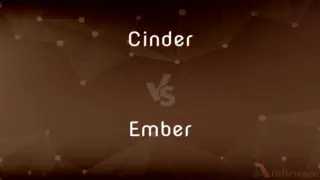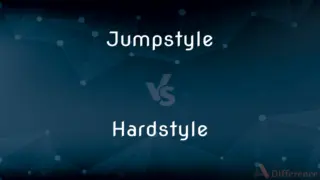Yea vs. Yep — What's the Difference?
By Urooj Arif & Fiza Rafique — Updated on April 16, 2024
"Yea" is a formal way to say yes, often used in voting contexts, while "Yep" is an informal, colloquial affirmation similar to "yes."

Difference Between Yea and Yep
Table of Contents
ADVERTISEMENT
Key Differences
"Yea" is primarily used in formal settings and is synonymous with an affirmative vote or agreement, whereas "Yep" is a casual and informal term that conveys agreement or acknowledgment without the formal undertones.
In legislative contexts, "Yea" is the official term used to express a positive vote, on the other hand, "Yep" would be considered too casual and inappropriate in such environments.
"Yea" often carries a tone of solemnity and seriousness, while "Yep" is perceived as friendly and laid-back, suitable for everyday conversations.
When it comes to historical usage, "Yea" has been part of English for centuries, originating from Old English, whereas "Yep" is a relatively modern variant, emerging as part of American English slang.
In terms of pronunciation, "Yea" is phonetically similar to "yay", which can sometimes cause confusion, whereas "Yep" is straightforward and universally recognized as an informal affirmation.
ADVERTISEMENT
Comparison Chart
Usage
Formal, especially in voting
Informal, casual conversation
Tone
Solemn, serious
Friendly, laid-back
Typical Context
Legislative, formal agreements
Everyday speech, informal settings
Historical Origin
Old English
Modern, American slang
Pronunciation
Similar to "yay"
Distinct and straightforward
Compare with Definitions
Yea
Synonym for yes in historical texts.
Yea, verily, thou speakest true.
Yep
Response indicating readiness.
Yep, let’s do it.
Yea
Used to express assent.
He said yea to the proposal.
Yep
Casual affirmation.
Yep, that's correct.
Yea
A formal expression of agreement.
The committee responded with a unanimous yea.
Yep
Informal yes.
Yep, I'll be there.
Yea
An affirmative vote.
All in favor, say yea.
Yep
An acknowledgment.
Yep, I understand.
Yea
Sometimes used for emphasis.
Yea, I will go.
Yep
Used to express agreement.
Yep, that sounds good to me.
Yea
Yes
She has the right to say yea or nay
Yep
Yes.
Yea
Variant spelling of yay
Yep
(informal) yes.
Yea
An affirmative answer
The British government would give the final yea or nay
Yep
(informal) Yes.
I'll take that as a yep, then.
Yea
Yes; aye.
Yea
Indeed; truly
They have spoken, yea, shouted their reply.
Yea
Variant of yay2.
Yea
An affirmative statement or vote.
Yea
One who votes affirmatively.
Yea
(dated) Yes, indeed.
Yea
Thus, so (now often accompanied by a hand gesture by way of measurement).
The pony was yea high.
Yea
(archaic) Or even, or more like, nay. Introduces a stronger and more appropriate expression than the preceding one.
Yea
(in some dialects of American English, including Southern, Western, and African American Vernacular) Yeah, right, yes.
Yea
Misspelling of yay
Yea
An affirmative vote, usually but not always spoken
Yea
Yes; ay; a word expressing assent, or an affirmative, or an affirmative answer to a question, now superseded by yes. See Yes.
Let your communication be yea, yea; nay, nay.
Yea
An affirmative vote; one who votes in the affirmative; as, a vote by yeas and nays.
Yea
An affirmative;
The yeas have it
Yea
Not only so, but;
I therein do rejoice, yea, and will rejoice
Common Curiosities
Is "yep" acceptable in professional emails?
"Yep" is generally too casual for professional emails; "yes" is preferred.
What is the primary use of "yea"?
"Yea" is used primarily as a formal affirmative, especially in voting.
Can "yea" and "yes" be used interchangeably?
In formal contexts, "yea" and "yes" can be interchangeable, but "yea" has a more formal connotation.
What is the historical origin of "yea"?
"Yea" originates from Old English and has been used in formal contexts for centuries.
Can "yep" be used in formal meetings?
"Yep" is generally too informal for formal meetings, where "yes" is more appropriate.
Can "yea" be used in legal documents?
"Yea" can be used in legal documents when formal agreement is required.
Is "yea" appropriate for written or spoken language?
"Yea" is appropriate for both, especially in formal written contexts like legislation.
How did "yep" come into common usage?
"Yep" emerged from American English as a casual form of "yes."
What is the difference in pronunciation between "yea" and "yay"?
"Yea" is pronounced like "yay," but is used differently, primarily in formal voting contexts.
Is "yea" commonly used in everyday conversation?
No, "yea" is typically reserved for formal settings and is not common in casual conversation.
What are some synonyms for "yep"?
Synonyms for "yep" include yes, sure, and alright.
Is "yep" recognized globally?
"Yep" is widely recognized in English-speaking countries, especially in the US.
What are some synonyms for "yea"?
Synonyms for "yea" include affirmative, agreed, and yes.
Share Your Discovery

Previous Comparison
Cinder vs. Ember
Next Comparison
Jumpstyle vs. HardstyleAuthor Spotlight
Written by
Urooj ArifUrooj is a skilled content writer at Ask Difference, known for her exceptional ability to simplify complex topics into engaging and informative content. With a passion for research and a flair for clear, concise writing, she consistently delivers articles that resonate with our diverse audience.
Co-written by
Fiza RafiqueFiza Rafique is a skilled content writer at AskDifference.com, where she meticulously refines and enhances written pieces. Drawing from her vast editorial expertise, Fiza ensures clarity, accuracy, and precision in every article. Passionate about language, she continually seeks to elevate the quality of content for readers worldwide.














































